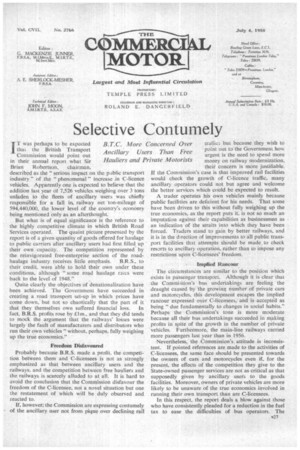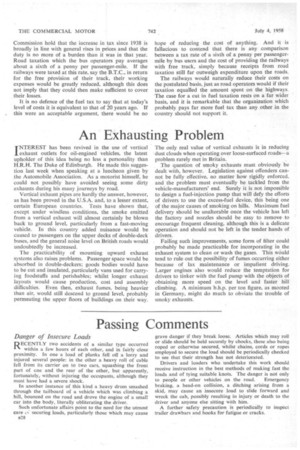Selective Contumely
Page 37

Page 38

If you've noticed an error in this article please click here to report it so we can fix it.
B.T.C.. More Concerned Over Ancillary Users Than Free Hauliers and Private Motorists
T was perhaps to be expected that the British Transport Commission would point out in theft annual report what Sir Brian Robertson, chairman, described as the " seriOus impact on the public transport industry" of the " phenomenal " increase in C-licence vehicles. Apparently one is expected to believe that the addition last year Of 7,526 vehicles weighing over 3 tons unladen to the fleets of ancillary users was chiefly responsible for a fall in. railway net ton-mileage of 594,440,000, the lower level of the country's economy being mentioned Only as an afterthought.
But what is of equal significance is the reference to the highly competitive climate in which British Road Services operated. The quaint picture presented by the report is of a given quantity of goods offered for haulage to public carriers after ancillary users had first filled. up their own capacity. The competition represented by the reinvigorated free-enterprise section of the road haulage industry receives little emphasis. B,R.S., to their credit, were able to hold their own under these conditions, although "some road haulage rates were back to the level of 1948."
Quite clearly the objectives of denationalization have been achieved. The Government have succeeded in creating a road transport set-up in which prices have come down, but not so chaotically that the part of it that they themselves own suffered financial loss. In fact, BR.S. profits rose by Elm., and that they did tends to mock the argument that the railways' losses were largely the fault of manufacturers and distributors who run their own vehicles" without, perhaps, fully weighing up the true economics."
Freedom Disfavoured Probably because B.R.S. made a profit, the competition between them and C-licensees is not as strongly emphasized as that between ancillary users and the railways, and the competition between free hauliers and the railways is scarcely alluded to at all. It is hard to avoid the conclusion that the Commission disfavour the freedom of the C-licensee, not a novel situation but one the restatement of which will be duly observed and reacted to.
If, however, the Commission are expressing contumely of the ancillary user not from pique over declining rail traffics but because they wish to point out to the Government how urgent is the need to spend more money on railway modernization, their concern is more justifiable. If the Commission's case is that improved rail facilities would check the growth of C-licence traffic, many ancillary operators could not but agree and welcome the better services which could be expected to result.
A trader operates his own vehicles mainly because public facilities are deficient for his needs. That some have been driven to this without fully weighing up the true economics, as the report puts it is not so much an imputation against their capabilities as businessmen as an indication of the straits into which they have been forced. Traders stand to gain by better railways, and it is in the direction of improvements to all public transport facilities that attempts Should be made, to check resorts to ancillary operation, rather than to impose any restrictions upon C-licensees' freedom, .Implied Rancour. • The circumstances are similar to the position which exists in passenger transport. Although it is clear that the Commiion's. bus undertakings are feeling the draught caused by the growing number of private cars and motorcycles, this development escapes the implied rancour 'expresSed over C-licensees, and :is accepted as being "due fundamentally to changes in social habits." Perhaps the Commission's tone is more moderate because all their bus undertakings succeeded in Raking profits in spite of the growth in the number of private vehicles. Furthermore, the main-line railways carried more passengers last year than in 1956.
Nevertheless, the -Commission's attitude is inconsistent. If pointed references are made to the activities of C-licensees, the same face should be presented towards the owners of cars and motorcycles even if, for the present, the effects of competition they give to the State-owned passenger services are not as critical as that supposedly given by ancillary users to the goods facilities. Moreover,. owners Of private vehicles are more likely to . be unaware of the true economics involved in running their own transport than are c7licensees.
In this respect, the report deals a blow against those who have consistently pleaded.for a reduction in the fuel tax to ease the difficulties of bus operators. The Commission hold that the increase in tax since 1938 is broadly in line with general rises in prices and that the duty is no more of a burden than it was in that year. Road taxation which the bus operators pay averages about a sixth of a penny per passenger-mile. If the railways were taxed at this rate, say the B.T.C., in return for the free provision of their track, their working expenses would be greatly reduced, although this does not imply that they could then make sufficient to cover their .losses.
It is no defence of the fuel tax to say that at today's level of costs it is equivalent to that of 20 years ago. If this were an acceptable argument, there would be no hope of reducing the cost of anything. And it is fallacious to contend that there is any comparison between a tax rate of a sixth of a penny per passengermile by bus users and the cost of providing the railways with free track, simply because receipts from road taxation still far outweigh expenditure upon the roads.
The railways would naturally reduce their costs on the postulated basis, just as road operators would if their taxation equalled the amount spent on the highways. The case for a cut in fuel taxation rests on a far wider basis, and it is remarkable that the organization which probably pays far more fuel tax than any other in the country should not support it.




























































































































